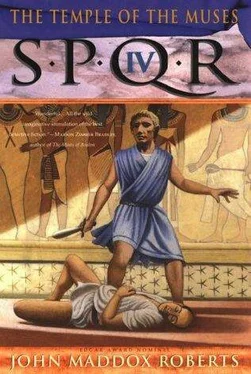John Roberts - Temple Of Muses
Здесь есть возможность читать онлайн «John Roberts - Temple Of Muses» весь текст электронной книги совершенно бесплатно (целиком полную версию без сокращений). В некоторых случаях можно слушать аудио, скачать через торрент в формате fb2 и присутствует краткое содержание. Жанр: Исторический детектив, на английском языке. Описание произведения, (предисловие) а так же отзывы посетителей доступны на портале библиотеки ЛибКат.
- Название:Temple Of Muses
- Автор:
- Жанр:
- Год:неизвестен
- ISBN:нет данных
- Рейтинг книги:5 / 5. Голосов: 1
-
Избранное:Добавить в избранное
- Отзывы:
-
Ваша оценка:
- 100
- 1
- 2
- 3
- 4
- 5
Temple Of Muses: краткое содержание, описание и аннотация
Предлагаем к чтению аннотацию, описание, краткое содержание или предисловие (зависит от того, что написал сам автор книги «Temple Of Muses»). Если вы не нашли необходимую информацию о книге — напишите в комментариях, мы постараемся отыскать её.
Temple Of Muses — читать онлайн бесплатно полную книгу (весь текст) целиком
Ниже представлен текст книги, разбитый по страницам. Система сохранения места последней прочитанной страницы, позволяет с удобством читать онлайн бесплатно книгу «Temple Of Muses», без необходимости каждый раз заново искать на чём Вы остановились. Поставьте закладку, и сможете в любой момент перейти на страницу, на которой закончили чтение.
Интервал:
Закладка:
"Why this sudden interest in religion, Decius? Surely being in Egypt hasn't infected you with their odd passions?" A true daughter of Sulla, Fausta believed in very little save greed and the lust for power.
"Religion is powerful and dangerous, Fausta. That's why we Romans harnessed it to the service of the state centuries ago. That's why we made the priesthoods a part of the civil service. It's why we forbade consultation of the Sybilline Books except in extreme situations, andonly then at the behest of the Senate."
"Your point being?"
"The most dangerous sort of religion is the volatile, emotional sort peddled by charismatic holy men like Ataxas. They have a way of making their short-term prophecies come true by inciting their fanatical followers to make them come true. People are unbelievably credulous. You notice that he heals deafness and palsy, afflictions easy to simulate. I'll wager he's never restored an amputated hand or foot."
"You wouldn't be interested if it was just some fraud enriching himself at the expense of fools," she asserted. "Do you detect a power play at work here?"
"I feel sure of it, although I am mystified as to its actual nature."
"Why do you care anything about the affairs of Egypt?" she asked.
"Because virtually anything that happens here touches upon Roman interests. Whatever Ataxas is up to, it can't be anything good. It would seem a pity to send in the legions to settle things here when a simple exposure of a plot might solve the problem."
Fausta smiled. "Julia says that you are mad but very interesting. I'm beginning to see what she means." No sooner had she pronounced this enigmatic statement than the lady herself showed up.
"This affair is getting utterly out of hand," Julia said. "Decius, I think we should return to the embassy."
"You talk as if the two of you were married already," Fausta observed.
"Will you come with us?" Julia asked Fausta, not bothering to inquire whether I wished to leave.
"I think I'll stay," Fausta said. "I've always heard about the debauchery of the Egyptian court, and this is a chance for a close look. Go on, you two. Enough of the Roman embassy staff remains for the sake of decorum." Actually, most of them had passed out or were well on their way, but I never doubted Fausta's ability to take care of herself.
We boarded a barge for the short row back to the Palace wharf.
"I've just had an interesting conversation with the concubine of the Parthian ambassador," Julia said.
"He didn't bring his wife, I take it?" I said.
"No. Wives and children must be left behind in Parthia against the ambassador's good behavior."
"The poor man. And what did this consolationary female have to say?"
"By great good luck she is a highly educated Greek hetaira. The ambassador's Greek is deficient, and she helps him with documents written in that language. Most of it is the usual tedious embassy business, but recently she read for him certain illustrated documents which he translated into Parthian. He sent the originals and translation to King Phraates in a locked chest under heavy guard."
I felt the familiar tingling, the one I always get when an important bit of the puzzle clicks into place. "And the nature of these documents?"
"They were plans for war machines. She could make nothing of the drawings, and most of the text was in technical language she wasn't familiar with, but there was some sort of device for setting fire to ships, and others for breaching walls and hurling missiles. There was also a receipt for a large sum of money in payment for these plans. The money was paid to Iphicrates of Chios. She thought it a great coincidence that he was murdered so soon after."
"Remind me never to entrust my secrets to a talkative Greek woman. Did she recall anything else?"
"This came out in the middle of a great gush of words concerning all the details of her life. I thought it would be unwise to press her about it. Easterners never listen to women, and she was dying for somebody to talk to." This, as it turned out, was an unfortunate choice of words.
Chapter VI
"The man's name is Eunos," Amphytrion said. "He is from Rhodes and was personal valet to Iphicrates for two years."
"Can he read?" I asked.
"Of course. All the Museum slaves assigned to personal service must meet certain standards of education. After all, if one must send a slave from a lecture hall to fetch a certain book, he must be able to recognize it."
"Sensible," I said. "Tell me, do you know whether the General Achillas or any other of the military nobles paid frequent visits to Iphicrates?"
He looked at me as if I had taken leave of my senses. "Meaning no disrespect to his Majesty's noble servants, the military men are an ignorant lot of Macedonian mountain bumpkins. Why would they consort with a scholar like Iphicrates?"
"Was Iphicrates ever absent for extended periods?" I asked.
"Why, yes. He took monthly trips by boat upon the river, taking measurements of the water's rise and fall and observing the effects of flowing water upon the banks. He was deeply interested in the dynamics of water. You saw the canal lock he was designing."
"Yes, I did. What was the duration of these trips?"
"I fail to see the pertinence of these questions, but he always took six days at the beginning of each month for these journeys."
"Is that a common sort of arrangement here?" I asked.
"Within reasonable limits, our scholars have perfect freedom to pursue their studies as they see fit. They need not even give lectures if they do not wish to. Here in the Museum, our goal is pure knowledge."
"Most commendable," I murmured. I was beginning to have severe doubts concerning the purity of Iphicrates's knowledge. There was a knock at the door and a middle-aged Greek entered, dressed in the livery tunic of the Museum. He bowed to Amphytrion and to me, then waited with that dignified self-possession common to slaves conscious of their own superiority in slave society.
"Eunos, the Senator wishes to question you concerning the late Iphicrates of Chios."
"Eunos," I began, "did you attend Iphicrates on the night of his murder?"
"Yes, Senator. I helped him prepare to go to the banquet that night, then he dismissed me. As I was walking down the gallery toward my quarters, he called me back and told me to bring some extra lamps. I did as he directed and set the lamps in his study. I was about to light them, but he dismissed me and I left."
"Had you any indication why extra lamps were required when he was about to attend a banquet?"
"He had a visitor. I had not heard the man arrive."
"Did you get a look at him?" I asked.
"When I came in with the lamps, the man was sitting in the bedroom to the rear. The light was dim. He seemed to be medium-sized, with dark hair and beard trimmed in the Greek fashion. He did not look my way. That was all I saw."
"Do you remember anything else that might help to identify, this stranger? Anything else Iphicrates might have done that was unusual?"
"I am sorry, sir. No, there was nothing else." I dismissed him and sat pondering for a while. It didn't surprise me that the man had not come forth earlier. Any intelligent slave knows better than to volunteer information unless asked. Amphytrion had less excuse for not asking, but that was understandable, too. It would have been beneath his philosophical dignity to listen to a slave.
"I would like another look at Iphicrates's quarters," I told Amphytrion as I rose from my chair.
"Be my guest, Senator, but we must remove Iphicrates's belongings soon. The distinguished scholar of music, Zenodotos of Pergamum, is to arrive soon and we shall need those rooms."
I found Asklepiodes finishing up an anatomy lesson and persuaded him to accompany me. We found the study in good order, the completed inventory arranged neatly on the large table. I picked up one of the silver bowls.
Читать дальшеИнтервал:
Закладка:
Похожие книги на «Temple Of Muses»
Представляем Вашему вниманию похожие книги на «Temple Of Muses» списком для выбора. Мы отобрали схожую по названию и смыслу литературу в надежде предоставить читателям больше вариантов отыскать новые, интересные, ещё непрочитанные произведения.
Обсуждение, отзывы о книге «Temple Of Muses» и просто собственные мнения читателей. Оставьте ваши комментарии, напишите, что Вы думаете о произведении, его смысле или главных героях. Укажите что конкретно понравилось, а что нет, и почему Вы так считаете.









